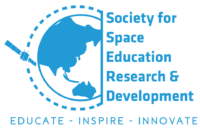Stay Updated! Follow SSERD on Social Media
There are limited research opportunities one could get as an undergraduate in India, especially in the field of Space Mission Design. SSERD provided us with this valuable opportunity. This 6-week internship is one of the best experiences of research-based work. We started as students from different parts of the world, mostly getting their research experience for the first time, and ended the journey as Team STARS that has designed an app for space mission design for Phase A studies. It was challenging, for sure. But we learned how to overcome them both as a team and individually.
The Initial And The Final Logo Of Team STARS
Coming to an objective that suits the interest of all the team members was an experience in and of itself. Our final objective for the internship was decided overnight by changing the votes of members of the team. Initially, we were a team of 5 but slowly reduced to 3. Initially, it was tough to Break the Ice and as no one was stepping up to lead the team when I pitched up to lead the team in Week 2. Team members like Juan spearheaded the entire project by doing the task provided before time went on to be the assistant leader of our team. Though Juan was from Mexico, he still managed to adjust and work for the betterment of the team. We will never forget playing XO with Juan and Adarsh while waiting for the rest.
After the 3-4 initial meetings with the mentors we narrowed down our part of research to work on mission payload instruments. Once we started working with our data, the entire team worked continuously until the last day. You can enter the BigBlueButton video conference any time of the day and hold team meetings. Juan and Adarsh worked on Mars Mission Instruments, Aaquib and Syed Ayaan worked on Earth Mission Instruments and I worked on Moon Mission Instruments. Initially we were going at a pretty good pace where even our mentors appreciated our work. But suddenly after week 3 everything just went down. Team was not active and there were a lot of problems we had to face while having meetings with our mentors and coordinator. Due to some unforeseen reasons two of our teammates backed off in the 4th week of the internship. It was a setback for the whole team as we were falling behind. We had to make a quick decision. That is when me and Juan tried to work out something that could bring us onto the track. We got some significant results by the end of the 5th week by working on Microsoft PowerApps and Glide Apps for our App. Finally the mentors were happy to see the progress of the 3 member team which managed to build a database based application for space mission design named “ Shipment Tools Assistant for RocketS ” (STARS). That is how the team got named.
What is a project that is not communicated? In our final week working on the report and presentation, we were swamped with work. Condensing our work into a 20-minute presentation, picking out relevant information from all the research we have done, was more difficult than it sounds. Ms. Nikhitha’s talk and Mr. Pavan Kumar’s guidance were immensely helpful in this process. Here we are, after a successful presentation, with a full project report in our hands. More than the project itself, we value the bond that has formed with each other.
The training sessions and technical talks were immensely useful, not just for the project, but for the rest of our careers. The structure of the program taught us commitment and how to consistently work. We are grateful to Mr. Vishnuvardhan Shakthibala and Ms. Rashika S.N ( our Mentors ), Ms. Anisha ( our Coordinator ), Mr. Pavan Kumar, Mr. Mahesh, Ms. Nikhitha C, and Mr. Sujay Sreedhar who made sure this journey was as smooth as possible. Heartfelt thanks to SSERD for giving young and aspiring researchers like us such an incredible opportunity.
– Written by Team STARS
For more information on the team visit the website of Team STARS, Team STARS is a part of SSERD’s Internship and Projects Divison’s Online Research Internships
